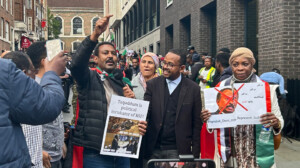Protests in Sudan condemning ‘El Obeid massacre’
The killing of five protesters, among them four school students, in El Obeid on Monday morning sparked major demonstrations in various Sudanese cities and towns later that day.
 Protest vigil against the military junta in Khartoum North, July 29, 2019 (RD).
Protest vigil against the military junta in Khartoum North, July 29, 2019 (RD).
The killing of five protesters, among them four school students*, in El Obeid on Monday morning sparked major demonstrations in various Sudanese cities and towns later that day.
Members of the Rapid Support Forces, Sudan’s main government militia, reportedly began shooting at secondary school students and activists demonstrating in the North Kordofan capital on Monday morning. Five of them were killed instantly. Dozens of others were injured, eight of them seriously.
The spokesman for the opposition Forces for Freedom and Change (FFC) in El Obeid, lawyer Osman Saleh, told Radio Dabanga yesterday that the students went out in spontaneous protests on Sunday and Monday, ostensibly against the stoppage of public transport due to fuel shortages, drinking water outages, increasing commodity prices, and the unavailability of bread.
The governor of North Kordofan imposed a curfew in El Obeid and three other large towns in the state.
In Greater Khartoum, tens of thousands of people took to the streets on Monday afternoon and evening denouncing the “El Obeid massacre”.
At various universities campuses in Khartoum state, El Soug El Arabi, El Ebeid Khatim Road, Burri El Dareisa, El Kalakla El Laffa, El Ribat El Watani, Siraj station, El Gomar, and other neighbourhoods staged protests, demanding justice, the immediate handing over of power to an interim civilian-led government, and removal of armed forces from all urban areas in the country.
In Rabak and El Duweim in White Nile state, Port Sudan in Red Sea state, in Sennar, Kassala, and other state capitals across the country, people demonstrated as well against the killing of peaceful protesters and the ruling junta that took power from former President Omar Al Bashir in a military coup on April 11.
* Initially, sources in El Obeid reported that five school students were killed.



Our editorial independence means that we can continue to provide factual updates about political developments to Sudanese and international actors, educate people about how to avoid outbreaks of infectious diseases, and provide a window to the world for those in all corners of Sudan. Support Radio Dabanga for as little as €2.50, the equivalent of a cup of coffee.












 and then
and then